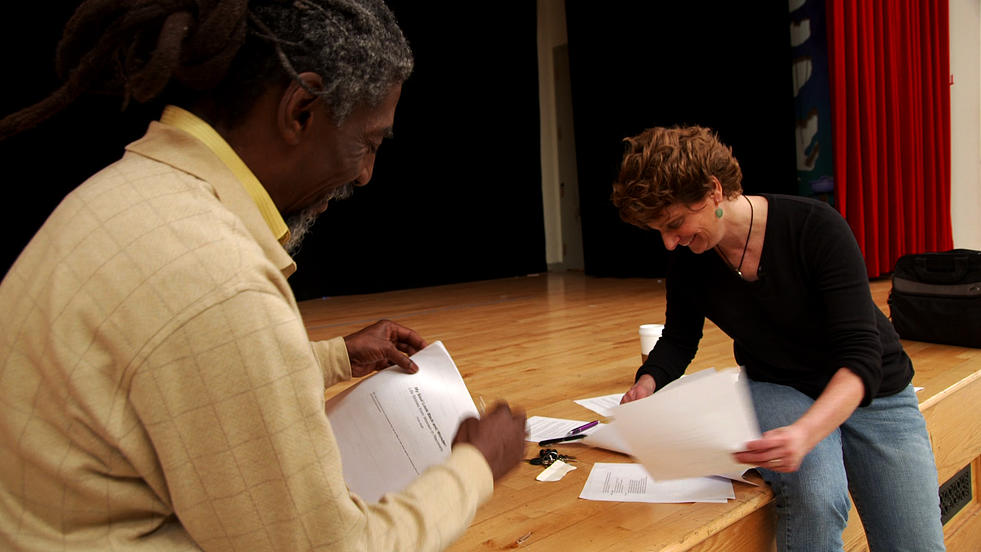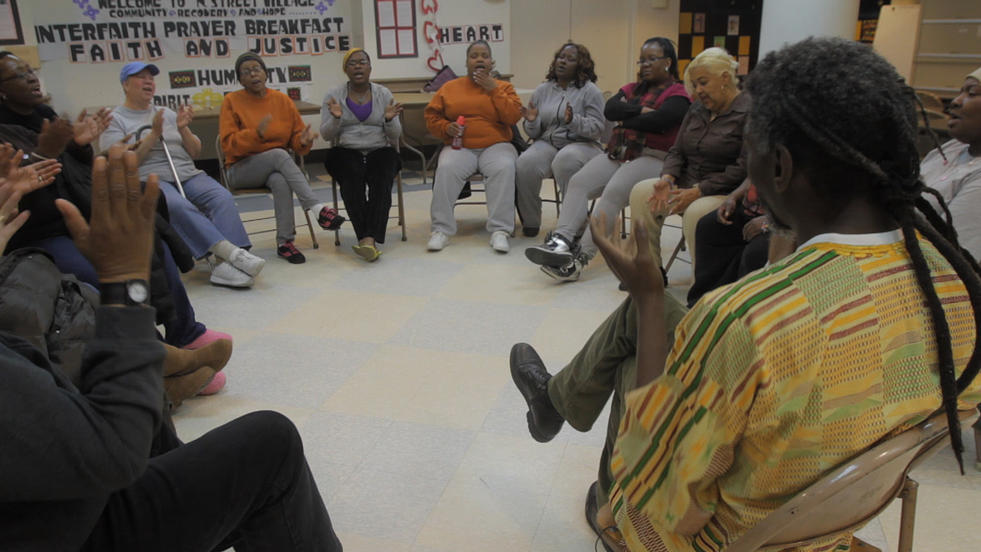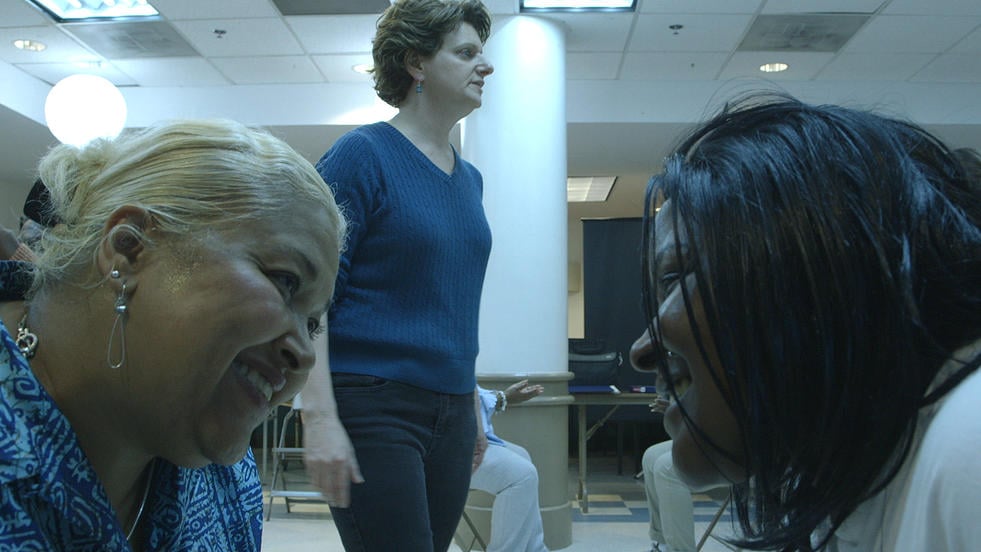Documentarian Nicole Boxer has made a career out of giving voices to women. After making 14 Women, about the challenges faced by women in the US Senate (a subject in which she has experience, as the daughter of Barbara Boxer), she produced the Oscar nominated film The Invisible War, on the continuing issue of sexual assault and rape in the military.
This year, Boxer has two documentaries on the big screen; first, as the producer of The Hunting Ground, a documentary investigating rape and sexual assault on college campuses; and second, as the director of How I Got Over, featuring fifteen women who had been homeless and were given the chance to tell their stories at the Kennedy Center. This show was part of DC’s theater lab program “Life Stories” in partnership with N Street Village, temporary housing for low income and homeless women. I spoke with Boxer about her new film, and the recent debate brewing over The Hunting Ground.
Lesley Coffin (TMS): You wrote in the press notes for How I Got Over that you personally wanted to look at and ask the question, “can art not only change a life, but save a life?” What did you want to point out to audiences by asking that question?
Nicole Boxer: One of the things that art does is it allows people to tell their story, and when people tell their story, it short-hands all the issues we talk about every day. When we talk about all the political and social issues, it can be very dry, or boring, or feel as if they are these issues too big to tackle. But when you talk about them in relation to our life stories, they are just that. Things that happen to people and become a social issue. So the quote you mention, “can art save a life the way doctors can save a life?” that came from me directing asking the director of the program, Tom Workman, “do you think art can save a life?” and he threw it back to me and asked, “well, if these people can, why can’t we?” And it’s an excellent question to ask ourselves.

TMS: Being a documentary filmmaker, you’ve had the opportunity to give voice to your subjects and voice your own views in a public forum. Have you seen that process as something therapeutic?
Boxer: I think it’s been extremely therapeutic for the women in this documentary who shared their stories in this kind of public forum, both on stage and on film. It gave them the opportunity to voice their stories, experiences, opinions, and it is empowering them. Often times we walk through life and wonder, does anyone really care? And there were women I met early in the process who said in those group sessions “why am I even doing this, my story doesn’t matter.” But in fact, when cumulatively you looked on stage and all these women tell their story, you couldn’t say, one person is more important than the other. As a chorus of voices, they painted this picture of an American experience.
Personally, I didn’t inject myself into very much of this film at all. But I appreciate that you asked the question because I really do appreciate that as a filmmaker, I get to speak with the press and do interviews and Q&As, and voice my opinion at that time. I appreciate being able to share my opinions, but I want my films to kick-start the conversations.
TMS: One of the big issues I hear over and over about the psychological impact of being homeless is the feeling of being invisible and losing your sense of humanity; not being a part of the larger society. For these women who had been homeless, were those psychological scars still evident?
Boxer: Yeah. We all crave being a part of a family unite and bigger part of society. We want to be productive members of a community and feel like we’re part of our tribe. Homelessness is a cumulative impact of people suffering a lot of trauma. There are a lot of things which lead to homelessness. It certainly isn’t a choice. A lot of the women in this made choices in their life, and they all had substance abuse problems, which made them lose touch with themselves. They would say, they weren’t themselves anymore because of the drug abuse. But what we have to have compassion for is that, like homelessness, drug abuse is a symptom of other issues, such as trauma, sexual abuse, child abuse, being pregnant at a young age, or lack of education. All things which society needs to address. And I think this project did bring back a sense of being a part of a community for these women and being seen, [something] they lost when they were homeless. And reconnected them with their families in many cases.

TMS: Why was it important for you to focus a project on the homeless issue in America on homeless women?
Boxer: I’ve always been interested in the lives of women and stories they have to tell. Having had a mother who broke the glass ceiling in terms of her political career, I grew up noticing the different issues men and women aligned themselves with, and seeing a divide of what concerns and issues are addressed in our media. And women’s stories are absolutely fascinating but still covered a little bit less in the news and media.
TMS: When I look at your films collectively, there is a theme of giving women a platform who hadn’t had a voice before or been silenced when they tried to speak up. What is the ongoing problem that necessitates these types of films?
Boxer: That is the million dollar question. Why are these problems being ignored? Why are sex crimes being ignored? I’ve always been attracted to the things in the background which don’t have a spotlight on them. Even when I meet someone, I’m always trying to see something underneath. I see them smile and think, what is the other thing coming off of them I’m feeling? There is a genre right now called social impact documentary which take these issues, something you might not have heard before, and put a human face onto the issue and ask the view “how can you not act”? It’s a political force that documentarians have today, and one of the things I try to do as a director who comes from a political family, is to have a film which had an emotional impact as well. Because if I can touch people emotionally, maybe they will be moved to act. I don’t have the answer to homelessness and drug addiction, but if we can touch each other’s hearts, we find the compassion which is needed to make changes.
TMS: Before I let you go, I really wanted to ask you about the film you produced, The Hunting Ground, and specifically the story which came out in which the President of Florida State criticized the film for being one-sided and not having a chance to address the issues raised.
Boxer: I think these are difficult issues if you are the one being accused. I know for a fact there was due diligence by the documentary and there is excellent journalism here. So to come out now and say “we weren’t given adequate time,” they’re on the record. But I think that is an ongoing thing that we need to deal with as documentarians. If we’re going to put a film out there, we have to be able to back it up. But, there is also the temptation for people to want to smoke screen it and change the issues, and make it about the journalist. And on that, I have two words: Rolling Stone. We can’t dismiss the thousands of girls being assaulted on college campuses because of one bad journalist. But the schools would like to change the conversation, but they aren’t going to be able to. And I think most of the schools will come onboard because they don’t want this problem on their campuses.
Lesley Coffin is a New York transplant from the midwest. She is the New York-based writer/podcast editor for Filmoria and film contributor at The Interrobang. When not doing that, she’s writing books on classic Hollywood, including Lew Ayres: Hollywood’s Conscientious Objector and her new book Hitchcock’s Stars: Alfred Hitchcock and the Hollywood Studio System.
Are you following The Mary Sue on Twitter, Facebook, Tumblr, Pinterest, & Google +?








